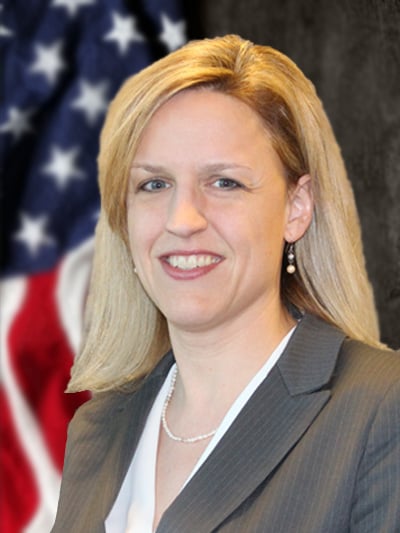NAAG hosted its inaugural Attorney General Symposium April 25-27, 2022 in Austin, Texas. This hybrid meeting included a one-day private program for attorneys general and their staff followed by two days of programming open to public registration. Twenty-three attorneys general and 21 attorney general staff, representing 44 offices, participated in the program.
The public session opened on Tuesday, April 26 with a tribute to former North Dakota Attorney General Wayne Stenehjem, led by Tennessee Attorney General Herbert H. Slatery III. View the tribute video.
Ohio Attorney General Dave Yost and Oregon Attorney General Ellen F. Rosenblum then led an interactive session on the history of attorneys general working together in a bipartisan fashion through NAAG to tackle some of the most important challenges affecting citizens across the country. The presentation highlighted recent bipartisan work of attorneys general on issues such as opioids, robocalls, supporting victims of crime, and protecting youth from the dangers of technology.
An IRS Criminal Investigations representative provided a comprehensive and easy-to-understand description of cryptocurrency, blockchain, and the dark web. The director of USDOJ’s National Cryptocurrency Enforcement Team gave an overview of crimes committed using cryptocurrency and the federal government’s actions to combat those crimes, in addition to discussing avenues for attorneys general to collaborate with federal agencies on such matters.
Meyer Koplow, partner at Wachtell, Lipton, Rosen & Katz, joined General Miller for a discussion on the resolution of major multistate cases and the best strategies for the long-term interests of defendants.
During lunch, Jim Steyer, founder of Common Sense Media and co-chair of the bipartisan Future of Tech Commission, gave a keynote about technology’s impact on our lives, highlighting the negative effects it can have on children. A major focus of the keynote was the importance of attorneys general protecting consumers in this space through enforcement actions and policy advocacy.
Supreme Court experts Stephen Vladeck and Allyson Ho discussed the impact of Justice Stephen Breyer’s retirement and replacement by Judge Ketanji Brown Jackson; debated the Court’s actions on emergency applications (sometimes known as the “Shadow Docket”); reviewed several of the Supreme Court Term’s most important cases to state attorney general offices, including cases involving state sovereign immunity and attorney general intervention; and took a quick look at the major cases the Court will be hearing next Term.
NAAG was joined virtually by Director of the White House Office of National Drug Control Policy Dr. Rahul Gupta and Drug Enforcement Administration Administrator Anne Milgram for a session that examined efforts to tackle the two key drivers of the overdose epidemic: untreated addiction and drug trafficking.
In an ethics session that offered continuing legal education credit, former Maine Attorney General and Harvard Law School lecturer in law Jim Tierney addressed some of the ways the Rules of Professional Conduct do and do not apply to attorneys general. He also led a cast of former attorneys general and staff through a hypothetical situation involving allegations of abuse at a prison.
Wednesday’s program began with a panel discussion about threats and opportunities resulting from recent technological advances, including the proper role of public and private sectors in managing theses issues. Following the panel, General Miller conducted a fireside chat with Brad Smith, president and vice chair of Microsoft. During the discussion, Smith shared insights on critical issues involving the impact of technology on society, including cybersecurity, privacy, and artificial intelligence. He also provided a preview of a since-released report on Russian cyberattacks on Ukraine.
The program closed with a panel discussion of the latest technological and regulatory developments related to autonomous vehicles, featuring experts from Ford, General Motors, and Waymo.





